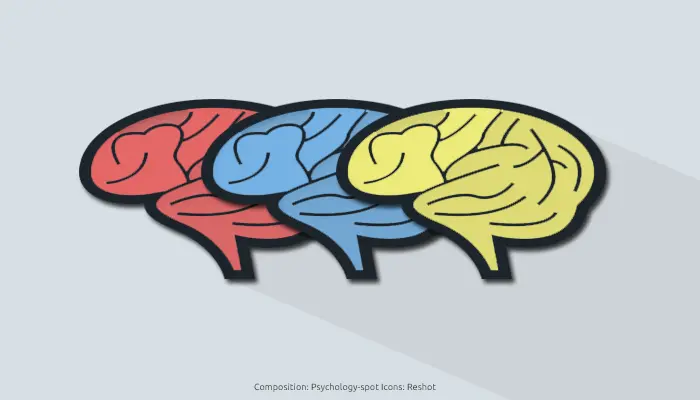
Covid-19 has not only put the whole world in check, leaving a huge toll of deaths, but some of the people who survive the disease are also left with sequelae that prevent them from resuming their normal lives.
What has been classified as persistent Covid is a syndrome that persists for weeks or months after the initial infection and is not related to the severity of the disease, but can affect both mild and seriously hospitalized patients.
Neurological and cognitive symptoms are the most worrisome since, associated with mood alterations and great fatigue and general malaise, they can profoundly affect the functional capacity of the person suffering from them. As a result, more and more neuroscientists are referring to a post-covid cognitive deficit.
What is post-covid cognitive deficit?
Just as the pandemic intensified in the UK, a team of neuroscientists at Imperial College London was collecting data on cognitive and mental health on a large scale as part of the ‘Great British Intelligence Test’, in collaboration with BBC2 Horizon. The test in question includes a series of tasks designed to assess different dimensions of cognitive ability.
They decided to take that opportunity to collect data on how the pandemic and COVID-19 were affecting the mental health and cognition of the participants. In the study, they analyzed data from 81,337 people who took the intelligence test between January and December 2020. Of the entire sample, 12,689 people reported having suffered from COVID-19 with varying degrees of respiratory severity.
After controlling for factors such as age, gender, native language, education level, and other variables, the researchers found that people who had contracted COVID-19 tended to underperform on the intelligence test compared to those who did not contracted the virus.
As expected, people who suffered from severe Covid-19 and needed mechanical ventilation showed a greater deficit since they lost 7 IQ points, but these deficiencies also occurred in people who had suffered a mild desease or passed it practically without symptoms.
Specifically, they noted that 192 hospitalized and 326 non-hospitalized people had significant cognitive deficits. These effects on intelligence and other cognitive abilities are probably due to the neurotropic capacities of coronaviruses, thanks to which they can evade the host’s immune response and remain in a latent state, causing acute and late neurological effects.
Specifically, the largest post-covid cognitive deficits were seen in tasks that required reasoning, planning, and problem solving, which are traditionally related to intelligence. To put those results in perspective, just think that in many cases it overcame the deficiencies found in people who have suffered a stroke.
These results are in line with other research conducted with smaller samples throughout the world in which cognitive difficulties have been found in people with persistent Covid. In fact, a study conducted at the University of Oxford indicated that some Covid-19 patients “Develop neurological symptoms such as headache, impaired consciousness, and paresthesia. They also report acute cognitive complications in attention and dysexecutive symptoms”.
Why does Covid-19 affect cognition?
The “brain fog” that has been reported in persistent COVID cases, which leads to problems for concentrating, memory loss and difficulty finding the right words, is associated with a damage to the prefrontal cortex. This area of the brain is the main one in charge of making the change between different tasks or mental processes, inhibiting automatic responses and updating the mental representations found in working memory.
That means that people with dysexecutive symptoms can also become more rigid in their behaviors and ideas, have difficulty controlling their impulses, and have blackouts from memory and attention problems.
Neuroscientists at the University of Oxford indicate that “These findings point to a possible role of the virus in the development of acute psychiatric symptoms and long-term neuropsychiatric sequelae of COVID-19. Brain pathologies associated with COVID-19 infection are likely to have a long-term impact on cognitive processes.”
They explain that “The virus has the potential to cause damage to the nervous system through different mechanisms.” However, the two main mechanisms are entry through the olfactory nerve and binding to angiotensin converting enzyme 2 (ACE2).
“Neurotropic viruses, such as coronaviruses, use sensory and motor neural pathways to enter the central nervous system, such as the olfactory nerve,” they explain. “Therefore, the virus can reach the brain causing inflammation and a demyelinating reaction. If infection is established, viruses can reach the entire brain in less than 7 days”. In fact, the olfactory and taste problems experienced by many patients could depend on this mechanism of infection.
“It has also been proposed that the SARS-CoV-2 spike protein can bind to ACE2 receptors in capillaries, breaking the blood-brain barrier and allowing the virus to enter the brain directly. Since neurons have a high density of ACE-2 and are highly binding to coronaviruses if they cross the blood-brain barrier, it is likely that SARS-CoV-2 may remain latent in the neurons of patients recovering from the effects of COVID-19, which increases the risk of long-term consequences by causing demyelination and neurodegeneration”, the researchers conclude.
Is it possible to recover from post-covid cognitive deficit?
A previous study conducted at Yale School of Medicine revealed that the cognitive deficits seen in hospitalized patients with respiratory diseases, have been maintained throughout the 5-year follow-up. Since Covid-19 is a recent disease, the evolution of cognitive symptoms is not known for sure.
That means that, despite vaccination, it is important that people continue to protect themselves so as not to get sick and avoid transmitting the virus. For those who already suffer from persistent Covid, there is neurorehabilitation, a process aimed at restoring, minimizing or compensating as much as possible the functional deficits developed as a consequence of a central nervous system condition.
Sources:
Kumar, S. et. Al. (2021) Neuropsychiatric and Cognitive Sequelae of COVID-19. Front. Psychol; 2021.577529.
Hampshire, A. et. Al. (2021) Cognitive deficits in people who have recovered from COVID-19. The Lancet; 10.1016.
Sasannejad, C. et. Al. (2019) Long-term cognitive impairment after acute respiratory distress syndrome: a review of clinical impact and pathophysiological mechanisms. Crit Care; 23(1):352.



